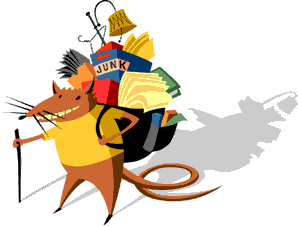“That’s all your house is, it’s a place to keep your stuff while you go out and get — more stuff.” -- George Carlin
 The New York Times on the cost of clutter:
The New York Times on the cost of clutter:
There is nothing like being forced to pack up every last thing you own, load it onto a truck, and unload and unpack it on the other end to make you question the true value of all that stuff. You find yourself wondering not only why you bought it, why you kept it, why it’s so hard to get rid of it — but why on earth you will undoubtedly buy more of it.
“We invest our hopes and dreams and imagined futures in the stuff that we buy,” Mr. Walsh said on the telephone. “People buy into this promise, and they fill their homes with stuff that never delivers on the promise, so they go back for more.”
Mr. Walsh, who was the decluttering drill sergeant on the cable show “Clean Sweep,” offers an exit ramp from that treadmill. Most people, he said, look at their home and ask, “What do I want to put in it?” Questions like this are likely to lead you straight to your favorite furniture store.
Instead, he suggests: “Ask what you want from the different spaces in your home. Do you want peace and harmony? Do you want intimacy, an exciting entertainment area, a haven?”
Viewing your belongings — or clutter — from this quality-of-life perspective makes it easier to pare them, according to Mr. Walsh. Yes, it’s painful to throw or give away things you’ve spent good money on. But again, what’s the real worth of those items in the context of your life?
The tendency to overconsume seems somewhat analogous to the "contagion of overeating". Just as nearly every American (even the poor) are able to afford far more calories than they need to survive, so too can we afford to buy far more than ever before. Paul Graham makes this point in his excellent essay on "Stuff":
In industrialized countries the same thing happened with food in the middle of the twentieth century. As food got cheaper (or we got richer; they're indistinguishable), eating too much started to be a bigger danger than eating too little. We've now reached that point with stuff. For most people, rich or poor, stuff has become a burden.
The tough part comes when the preceived cost (in terms of time, money, and effort) of getting rid of stuff we no longer use exceeds the benefit, we end up renting out self-storage units and buying bigger houses instead. It seems like I know a lot of people who feel they have too much clutter, but not many people who are willing to do much about it.
P.S. -- Here are some tips for how to cure PackRat-itis.
(HT Unclutterer)
No comments:
Post a Comment